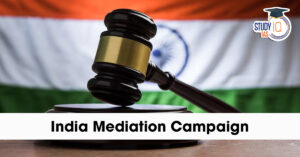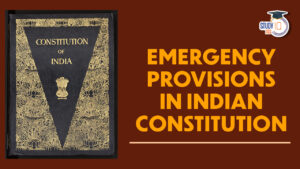Table of Contents
Advocate General of State
The Advocate General of the State (AGS) is the highest law officer in India established by the Constitution. As the Chief Legal Advisor to the State Government, the AGS provides legal guidance and represents the government in the Supreme Court and High Courts. The AGS is part of the State Executive, which includes the Governor, Chief Minister, Council of Ministers, and the AGS itself. However, the Advocate General is not a member of the State Cabinet, as there is a separate Law Minister for legal matters at the state level.
The Advocate General of State is an important part of Indian Polity which an important subject in UPSC Syllabus. Students can also go for UPSC Mock Test to get more accuracy in their preparations.
About Advocate General of State
According to Article 165 of the Indian Constitution, the Governor appoints the Advocate General of the State as the highest legal official in the State to represent the interests of the State Government. He provides legal advice to the relevant State’s government and carries out any other legal tasks that may be delegated to him. Additionally, he occasionally carries out the duties that the Governor assigns to him. Article 165 of Chapter 2 of Part VI of the Indian Constitution establishes the position of Advocate General for States. His authority and role, however, are outlined in Articles 165 and 177 of the Indian Constitution.
Advocate General of State: Appointment,Term, Removal & Resignation
The Advocate General of a state is appointed by the Governor of that state.
Qualifications:
- Must be a citizen of India.
- Must meet one of these criteria:
- Have held a judicial office in the state’s judicial service for 10 years, or
- Been an advocate in a High Court for 10 years.
Term:
The term of the Advocate General is not fixed by the Constitution.
Removal of the Advocate General:
- The Constitution does not specify how or on what grounds the Advocate General can be removed.
- The Governor can remove the Advocate General at any time.
Resignation:
- The Advocate General can resign by submitting a resignation to the Governor.
- It is customary for the Advocate General to resign when the government (Council of Ministers) resigns or is replaced, as they are appointed on the Council’s advice.
Remuneration:
- The Advocate General’s pay is not fixed by the Constitution; it is determined by the Governor.
- The Advocate General does not receive a salary but a retainer and can also take on private cases with some limitations.
Advocate General of State Constitutional Provisions
Below are all the constitutional provisions of the Advocate General of States:
| Article-No. | Provisions |
| Article 165 | An individual qualified to serve as a High Court judge must be appointed by the governor of each state to serve as the state’s advocate general.
The Advocate General’s responsibilities include discharging the duties given to him by or under this constitution or any other law currently in effect as well as providing the state with legal advice and carrying out any other legal-related tasks that may from time to time be delegated to him by the Governor. |
| Article 177 | Rights of the Advocate General with regard to the State Legislature’s Houses and its Committee. |
| Article 194 | Rights, privileges, and obligations of the attorney general |
Advocate General of State Duties and Functions
As the chief legal representative of the State’s government, the Advocate General carries out the responsibilities listed below. His job is to advise the State Government on any legal matters that the Governor refers to him for advice. The function is to carry out any additional legal obligations that the state governor delegates to you. The function is to carry out the responsibilities assigned to him/her by the Constitution or any other law.
The Advocate General is permitted to represent the State in any court of law while carrying out his official responsibilities. The Advocate General is entitled to speak and participate in both Houses of the State legislature’s sessions. Additionally, he or she has the right to participate in committee meetings without being able to vote in any committee of the State legislature. The Advocate General also benefits from all the privileges and immunities given to state legislators.
Advocate General of State Limitations of Powers
The Advocate General is only given the authority granted by law or the State government. As a result, the Advocate General is prohibited from acting in excess of his or her legal authority. He/she is not permitted to act as an advisor or advocate for State Government officials. When called upon to provide advice or make an appearance on behalf of the State Government, he/she should refrain from doing so and not hold a brief.
He or she shouldn’t offer advice or file a lawsuit against the state government in question. Without the State Government’s consent, he or she should not represent the accused in criminal proceedings. This is done to prevent any appearance of bias or a conflict of interest. Without the consent of the State Government, the Advocate General of a State should not take an appointment as a director in any corporation or enterprise.
Advocate Generals of India List
Here is a list of state-wise Advocate Generals in India is given below:
| State | Advocate General |
| Andhra Pradesh | Subrahmanyam Sriram |
| Arunachal Pradesh | Nilay Ananda Dutta* |
| Assam | Devajit Lon Saikia |
| Bihar | Lalit Kishore |
| Chhattisgarh | Satish Chandra Verma |
| Goa | Devidas Pangam |
| Gujarat | Kamal Trivedi |
| Haryana | Baldev Raj Mahajan |
| Himachal Pradesh | Ashok Sharma |
| Jharkhand | Rajiv Ranjan |
| Karnataka | Prabhuling K. Navadagi |
| Kerala | K Gopala Krishna Kurup |
| Madhya Pradesh | Prashant Singh |
| Maharashtra | Ashutosh Kumbhakoni |
| Manipur | Lenin Singh Hijam |
| Meghalaya | Amit Kumar |
| Mizoram | Diganta Das |
| Nagaland | K. N. Balagopal |
| Odisha | Ashok Parija |
| Punjab | Vinod Ghai |
| Rajasthan | Narpat Mal Lodha |
| Sikkim | Vivek Kohli |
| Tamil Nadu | Thiru R.Shunmugasundaram |
| Telangana | B. S. Prasad |
| Tripura | Siddhartha Shankar Dey |
| Uttar Pradesh | Ajay Kumar Mishra |
| Uttarakhand | S. N. Babulkar |
| West Bengal | Mr. Soumendra Nath Mookherjee |
Attorney General of India Vs. Advocate General of the State
| Attorney General of India | Advocate General of the State |
|---|---|
| Appointment: President | Appointment: Governor |
| Qualification: At par with a Judge of the Supreme Court | Qualification: At par with the Judge of a High Court |
| Remuneration: As decided by the President | Remuneration: As decided by the Governor |
| Term: Not mentioned in the Constitution | Term: Not mentioned in the Constitution |
Rights:
|
Rights:
|
Advocate General of State UPSC
The Attorney General of India in the Centre is equivalent to the Advocate General of the State. The Advocate General is a member of the State Executive, just like the Attorney General in the Centre. Thus, in India’s federal system of government, the office of the advocate general is crucial to the day-to-day operations of the state governments. The UPSC Syllabus’s Polity part includes a discussion of the Advocate General of State. Students can read all the details related to UPSC by visiting the official website of StudyIQ UPSC Online Coaching.


 India Mediation Campaign, Objectives, Pr...
India Mediation Campaign, Objectives, Pr...
 Emergency Provisions in Indian Constitut...
Emergency Provisions in Indian Constitut...
 Directive Principles of State Policy (DP...
Directive Principles of State Policy (DP...





















